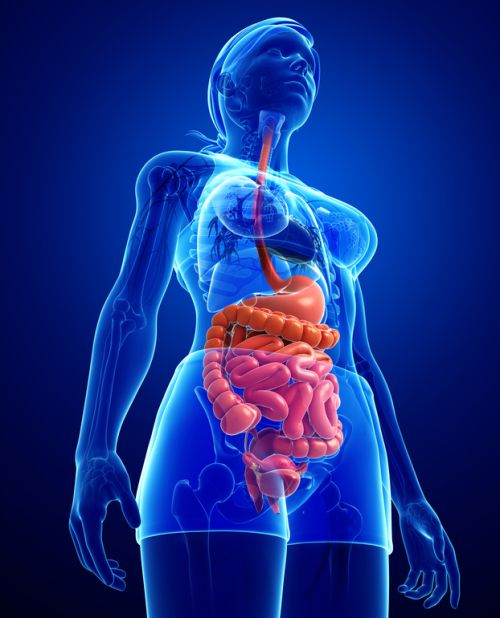Food poisoning, gastrointestinal infections, pregnancy, the hangover from too much alcohol or traveling on a rocking sea are common causes of nausea. The vomiting center in the brain is responsible for the queasy feeling in the stomach. Sudden nausea is a symptom that is easy to manage with home remedies and medication.
Nausea is an extremely uncomfortable feeling that probably everyone is familiar with. One has a queasy feeling in the stomach and is constantly afraid of vomiting. Vomiting can, but does not have to, occur.
In the case of nausea, other accompanying symptoms can occur at the same time, such as dizziness, abdominal pain, stomach pain, loss of appetite, pressure in the upper abdomen, feeling of fullness, diarrhea, visual disturbances or headaches.
In itself, sudden nausea is a vital protective reflex of the body, which signals that something is wrong. By vomiting, the organism tries to get rid of toxins and pollutants that have been ingested through spoiled food, for example. The vomiting center in the brain is responsible for nausea and vomiting.
These are the causes behind sudden nausea
Nausea is an accompanying symptom that has a wide variety of causes. People get sick when they have a gastrointestinal infection, ate spoiled food, drank too much alcohol or took certain medications. This form of malaise also plays a role in many diseases, but it can also be the first sign of an existing pregnancy.
Disturbance of the brain, nerves, balance, circulation
Nausea caused by gastrointestinal disorders
-

Our stomach is a sensitive organ: heartburn, nausea, stomach irritation and a feeling of fullness are common problems. Most of the time the complaints extend into the intestines
to the special
Changes in metabolism and / or hormonal balance
Medicines, drugs, and environmental toxins cause sudden nausea
- Nausea as a side effect of many drugs (see package insert)
- especially drugs for cancer treatment (cytostatics, chemotherapy)
- After-effects of anesthesia after surgery
- Substance abuse, for example alcohol, some hallucinogens, or ecstasy
- Radiation in cancer therapy or radiation from an accident
- Heavy metal poisoning
Psychological factors that can promote nausea:
- Disgust for certain foods, smells or sights
- Stress or excitement
- anxiety
- depressions
Diagnostic options for nausea
There are numerous causes that the doctor will first track down in a conversation with you. He asks you about your symptoms and the clinical picture (anamnesis). The doctor is interested in the following questions:
-

Fever, pain, shortness of breath: Search specifically for symptoms and their possible triggers
to the symptom check
How long have you been suffering from nausea? For days, weeks, months?
How often do you feel sick – daily, several times a day?
Are there any triggers associated with the onset of nausea?
Does the nausea go hand in hand with vomiting?
Is there a possibility of pregnancy?
Have you consumed any spoiled food, for example raw eggs, oysters, meat or fish?
Do you have any known illnesses, for example gastrointestinal flu, irritable bowel syndrome, food allergies, food intolerance (lactose intolerance, fructose intolerance), gluten intolerance, migraine, Menière's disease or cancer?
Are you suffering from stress, anxiety or depression?
Have you noticed any other symptoms, for example stomach cramps, stomach pain, diarrhea, tiredness, fatigue, fever, headache?
These and other questions give the doctor initial indications of possible causes. Based on your medical history, the time course of the nausea and the accompanying symptoms, the doctor will decide whether the cause is harmless or whether further diagnostics are necessary.
Further examinations for sudden nausea
Further diagnostics include examinations that are related to the suspected cause of the nausea.
These include, for example:
Nausea and vomiting are usually harmless in nature. The symptoms can be brought under control with suitable treatments and home remedies.
What helps against nausea? Treatment options and home remedies
The treatment doctors use for the symptom depends on the cause. For example, pregnancy sickness is treated differently than travel sickness or discomfort due to an inflammation of the stomach lining. If diseases are the cause, doctors first fight them. This usually also subsides the nausea.
Gastrointestinal flu: symptoms and home remedies
TargetVideo
The following therapies are effective:
Light food: Eat foods that are easy to digest, such as rusks or gruel. Avoid foods that are difficult to digest and put even more strain on the stomach.
Food abstinence: In the case of inflammation of the stomach lining, for example, it helps to avoid eating for a few days. The absence of food ensures that the stomach is not strained any further and can recover.
Take care of Rest and relaxation and avoid excitement and stress – both of which tend to be more upsetting.
Anti-emetic agents (antiemetics): The drugs work directly in the vomiting center of the brain; Doctors use them, for example, for pregnancy sickness, travel sickness or nausea as a result of chemotherapy or radiation. Known active ingredients are, for example, dimenhydrinate, dimeticone or domperidone. In the case of food poisoning, antiemetics that suppress vomiting are not useful.
If the nausea is a side effect of medication, try to switch to an alternative preparation in consultation with your doctor.
Nausea During Pregnancy: Have a bite to eat before you get up. For example, dry oat flakes or a piece of bread are suitable.
Homeopathic remedies also sometimes help fight nausea. These include, among others, Ipecacuanha (vomitus root,) Nux vomica (peanut nut), Pulsatilla (pasque flower) or Okoubaka (West African jungle tree).
Prokinetics: These are drugs that accelerate the transport of the food in the gastrointestinal tract and reduce nausea; there are also herbal supplements.
Home remedies for sudden nausea
Also, try some proven home remedies to ease or eliminate the discomfort.
To drink tea: Chamomile, peppermint, lemon balm, fennel or ginger tea, for example, have proven themselves. You can also chew a piece of fresh ginger. The herbal ingredients soothe the irritated stomach and relieve nausea.
Get some fresh air: Take a short walk in the fresh air or open the window and ventilate adequately – this will dispel the nausea.
Put on loose clothingthat doesn't constrict the abdominal area. A tight skirt or belt increases nausea.
put a moist and warm compress with undiluted fruit vinegar or diluted lemon juice on your upper abdomen. The heat has an antispasmodic and pain reliever.
Smelling essential oils like peppermint, lemon balm or lanvendel can calm you down and soothe your stomach.
Basically: If you suffer from constant nausea or if it lasts for a long time, always consult a doctor to clarify the exact cause. It should be noted that frequent vomiting will cause you to lose a lot of fluids and minerals. Make sure to make up for your fluid and electrolyte loss. Sometimes special electrolyte solutions (rehydration solutions) from the pharmacy or the internet mail order company help.

